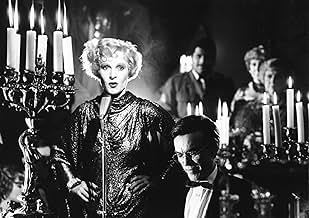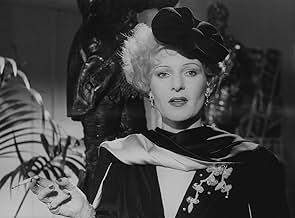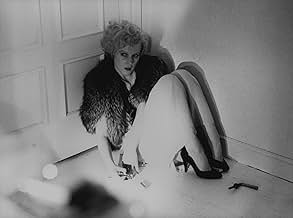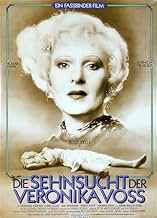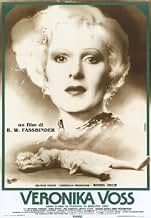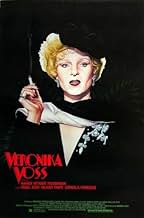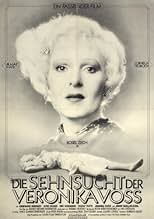CALIFICACIÓN DE IMDb
7.6/10
8.1 k
TU CALIFICACIÓN
La vida de Sybille Schmitz, que alcanzó la fama bajo el régimen nazi, pero cuya carrera quedó destruida después.La vida de Sybille Schmitz, que alcanzó la fama bajo el régimen nazi, pero cuya carrera quedó destruida después.La vida de Sybille Schmitz, que alcanzó la fama bajo el régimen nazi, pero cuya carrera quedó destruida después.
- Dirección
- Guionistas
- Elenco
- Premios
- 4 premios ganados y 4 nominaciones en total
Günther Kaufmann
- G.I.
- (as Günter Kaufmann)
- …
- Dirección
- Guionistas
- Todo el elenco y el equipo
- Producción, taquilla y más en IMDbPro
Opiniones destacadas
In the 50's, in a rainy night in Germany, the sports reporter Robert Krohn (Hilmar Thate) offers his umbrella to the former successful UFA actress Veronika Voss (Rosel Zech) but he does not recognizes her. Later she calls him inviting for a drink, and he finds an unstable and decadent actress living in her past success. In a mixed sensation of love, empathy and curiosity, Robert has an affair with Veronika, and discloses a dangerous gang leaded by Dr. Marianne Katz (Annemarie Düringer) that addicts wealthy patients in morphine to get their fortune when they die.
"Die Sehnsucht der Veronika Voss" is a melancholic, bitter and depressive tale based on the reality of an era, and the association with "Sunset Boulevard" is immediate. The story is based on the last years of the German actress Sybille Schmitz (1909-1955), who died due to an overdose of sleeping pills. The performance of Rosel Zech is impressive, showing the glamour of a former star in the Nazi period and the depression of an addicted woman in the 50's. Hilmar Thate is also perfect in the role of a simple innocent man that faces a greedy world of pain and death. The magnificent cinematography in black and white, using perfectly light and shadows, is homage to the Golden Age of Hollywood. My vote is eight.
Title (Brazil): "O Desespero de Veronika Voss" ("The Despair of Veronika Voss")
"Die Sehnsucht der Veronika Voss" is a melancholic, bitter and depressive tale based on the reality of an era, and the association with "Sunset Boulevard" is immediate. The story is based on the last years of the German actress Sybille Schmitz (1909-1955), who died due to an overdose of sleeping pills. The performance of Rosel Zech is impressive, showing the glamour of a former star in the Nazi period and the depression of an addicted woman in the 50's. Hilmar Thate is also perfect in the role of a simple innocent man that faces a greedy world of pain and death. The magnificent cinematography in black and white, using perfectly light and shadows, is homage to the Golden Age of Hollywood. My vote is eight.
Title (Brazil): "O Desespero de Veronika Voss" ("The Despair of Veronika Voss")
Like many other Fassbinder films "Die Sehnsucht der Veronika Voss" tells about a decline and is very depressing. It is a visually stunning film that shows how much Fassbinder admired the classical Hollywood cinema and especially the films of Douglas Sirk. Like the films of his idol this film is stylish and artificial to an extreme extent which creates quite a distance between itself and the audience. Probably an even greater distance, since the style and the artificiality are used more consciously here, even as a instrument of alienation. So it is more fascinating than touching or even moving and might leave one even cold. Nevertheless the story is intriguing and it really tells something about the post war society in West Germany, so the film is interesting and even fascinating to watch. The scene where Rosel Zech as Veronika sings "Memories Are Made Of This" is very haunting, a gem.
This sumptuous black and white period piece, tells the story of a once famous film star, Veronika Voss (Rosel Zech). After a chance encounter on a bus with Robert Krohn (Hilmar Thate), there lives are entwined, with Krohn finding himself trapped in a cat-and-mouse search for Voss's sanity, her past lives, and the many sycophants and gold diggers in 1950's Germany. Voss, now struggling to find work after a highly successful period, particularly in the 1940's, is addicted to drugs and alcohol and has paranoid delusions when out on the street; Krohn is pulled into this as he did not recognise who she was, and she vaguely sees him as protection.
One of the last of Fassbinder's films - he died of an overdose (the official conclusion was suicide) in 1982 - which was also the last of a trilogy focusing on Germany's economic boom in the 1950's (the others being The Marriage of Maria Braun (1979) and Lola (1981)), the film also reflects some of the themes that the New German Cinema at the time. It was a time that Germany was reflective of World War 2, and the trauma that prevailed in a country torn between guilt and a resurgence of decadence and wealth as in the 1920's Weimar Republic. It is stated in the film that Voss's best period was during this period, and that she had been the star of Nazi Germany. After the fall of Nazi domination, she was cast aside.
Like Billy Wilder's Sunset Boulevard (1950), Veronika Voss highlights an industry that can easily create monsters, and also devastate lives. But unlike Wilder's subtle version of lost fame, Fassbinder shows the devastating effects of drug addiction, and the underbelly of society that is encountered in this process. Historically though, this is deeper and a hell of a lot more emotionally charged and interesting than Sunset. After all, this is not a Hollywood story, but is a post-World War 2 story of judgement, and loss after such a integrally debasing event in human history. How do you continue after working under the despotic power of the Nazi party? The elements of Nazi Germany are still in process, in the form of Veronika's control.
The film is said to be based upon the real-life German film actress, Sybille Schmitz, who died of an overdose in 1955 at the tender age of 45. The film shows shows that the shadow of the war had a lasting effect on the German nation, that would take decades to come to terms with. This is film making par excellence. Haunting, beautiful, with a climax that is inevitable, shocking, but very satisfactory. Rosel Zech's performance is pitch perfect, her face in a constant state of anguish.
www.the-wrath-of-blog.blogspot.com
One of the last of Fassbinder's films - he died of an overdose (the official conclusion was suicide) in 1982 - which was also the last of a trilogy focusing on Germany's economic boom in the 1950's (the others being The Marriage of Maria Braun (1979) and Lola (1981)), the film also reflects some of the themes that the New German Cinema at the time. It was a time that Germany was reflective of World War 2, and the trauma that prevailed in a country torn between guilt and a resurgence of decadence and wealth as in the 1920's Weimar Republic. It is stated in the film that Voss's best period was during this period, and that she had been the star of Nazi Germany. After the fall of Nazi domination, she was cast aside.
Like Billy Wilder's Sunset Boulevard (1950), Veronika Voss highlights an industry that can easily create monsters, and also devastate lives. But unlike Wilder's subtle version of lost fame, Fassbinder shows the devastating effects of drug addiction, and the underbelly of society that is encountered in this process. Historically though, this is deeper and a hell of a lot more emotionally charged and interesting than Sunset. After all, this is not a Hollywood story, but is a post-World War 2 story of judgement, and loss after such a integrally debasing event in human history. How do you continue after working under the despotic power of the Nazi party? The elements of Nazi Germany are still in process, in the form of Veronika's control.
The film is said to be based upon the real-life German film actress, Sybille Schmitz, who died of an overdose in 1955 at the tender age of 45. The film shows shows that the shadow of the war had a lasting effect on the German nation, that would take decades to come to terms with. This is film making par excellence. Haunting, beautiful, with a climax that is inevitable, shocking, but very satisfactory. Rosel Zech's performance is pitch perfect, her face in a constant state of anguish.
www.the-wrath-of-blog.blogspot.com
A famous German actress, Veronika Voss (Rozel Zech) in her forties tries to revive her career while struggling with alcohol and drugs in the final chapter to Fassbinder's trilogy about collapse of the West German postwar dream. The film was inspired by the tragic life of famous UFA actress, Sybille Schmitz (1909-1955). She began her career in the films by the giants such Georg Wilhelm Pabst and Carl Theodor Dreyer and soon became one of Germany's beloved actress. Everything changed during the WWII and especially after its end.
Fassbinder's film which was shot in black and white visually is very impressive. "Light and shadows are two cinema's best secrets" says Veronika in the movie and light and shadows make the film a joy to behold. I like it but I think it is the weakest part of the trilogy perhaps because "Lola" and "Maria Braun" are so strong. I found the documentary about Sybille Schmitz, "Dances with Death" which is included on Criterion DVD much more compelling.
Veronika - 7/10 Dances with Death 8.5/10
Fassbinder's film which was shot in black and white visually is very impressive. "Light and shadows are two cinema's best secrets" says Veronika in the movie and light and shadows make the film a joy to behold. I like it but I think it is the weakest part of the trilogy perhaps because "Lola" and "Maria Braun" are so strong. I found the documentary about Sybille Schmitz, "Dances with Death" which is included on Criterion DVD much more compelling.
Veronika - 7/10 Dances with Death 8.5/10
This movie left me feeling rather low. Its world is quite bleak. People are either strong or weak in the face of a society that feels cold. Looks like being strong won't make any difference in the long run. A very sad tale with beautiful black and white photography.
¿Sabías que…?
- TriviaBased on the true story of German film star Sybille Schmitz.
- ErroresThe film is set in 1955 but the song "The Battle of New Orleans" by Johnny Horton, released in 1959, is heard on the radio a number of times.
- Citas
Dr. Marianne Katz: Artists are different from ordinary people. They are wrapped up in themselves, or simply forgetful.
Selecciones populares
Inicia sesión para calificar y agrega a la lista de videos para obtener recomendaciones personalizadas
- How long is Veronika Voss?Con tecnología de Alexa
Detalles
- Fecha de lanzamiento
- País de origen
- Idiomas
- También se conoce como
- Veronika Voss
- Locaciones de filmación
- Productoras
- Ver más créditos de la compañía en IMDbPro
Taquilla
- Presupuesto
- DEM 2,600,000 (estimado)
- Total en EE. UU. y Canadá
- USD 8,144
- Fin de semana de estreno en EE. UU. y Canadá
- USD 11,623
- 16 feb 2003
- Total a nivel mundial
- USD 8,148
- Tiempo de ejecución1 hora 44 minutos
- Color
- Mezcla de sonido
- Relación de aspecto
- 1.66 : 1
Contribuir a esta página
Sugiere una edición o agrega el contenido que falta

Principales brechas de datos
By what name was Die Sehnsucht der Veronika Voss (1982) officially released in India in English?
Responda
